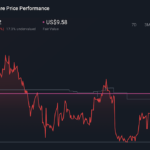
Bloomberg
A Crypto Kid Had a $23,000-a-Month Condo. Then the Feds Came
(Bloomberg) — Stefan Qin was just 19 when he claimed to have the secret to cryptocurrency trading.Buoyed with youthful confidence, Qin, a self-proclaimed math prodigy from Australia, dropped out of college in 2016 to start a hedge fund in New York he called Virgil Capital. He told potential clients he had developed an algorithm called Tenjin to monitor cryptocurrency exchanges around the world to seize on price fluctuations. A little more than a year after it started, he bragged the fund had returned 500%, a claim that produced a flurry of new money from investors.He became so flush with cash, Qin signed a lease in September 2019 for a $23,000-a-month apartment in 50 West, a 64-story luxury condo building in the financial district with expansive views of lower Manhattan as well as a pool, sauna, steam room, hot tub and golf simulator.In reality, federal prosecutors said, the operation was a lie, essentially a Ponzi scheme that stole about $90 million from more than 100 investors to help pay for Qin’s lavish lifestyle and personal investments in such high-risk bets as initial coin offerings. At one point, facing client demands for their money, he variously blamed “poor cash flow management” and “loan sharks in China” for his troubles. Last week, Qin, now 24 and expressing remorse, pleaded guilty in federal court in Manhattan to a single count of securities fraud.“I knew that what I was doing was wrong and illegal,” he told U.S. District Judge Valerie E. Caproni, who could sentence him to more than 15 years in prison. “I deeply regret my actions and will spend the rest of my life atoning for what I did. I am profoundly sorry for the harm my selfish behavior has caused to my investors who trusted in me, my employees and my family.”Eager InvestorsThe case echoes similar cryptocurrency frauds, such as that of BitConnect, promising people double-and triple-digit returns and costing investors billions. Ponzi schemes like that show how investors eager to cash in on a hot market can easily be led astray by promises of large returns. Canadian exchange QuadrigaCX collapsed in 2019 as a result of fraud, causing at least $125 million in losses for 76,000 investors.While regulatory oversight of the cryptocurrency industry is tightening, the sector is littered with inexperienced participants. A number of the 800 or so crypto funds worldwide are run by people with no knowledge of Wall Street or finance, including some college students and recent graduates who launched funds a few years ago.Qin’s path started in college, too. He had been a math whiz who planned on becoming a physicist, he told a website, DigFin, in a profile published in December, just a week before regulators closed in on him. He described himself on his LinkedIn page as a “quant with a deep interest and understanding in blockchain technology.”In 2016, he won acceptance into a program for high-potential entrepreneurs at the University of New South Wales in Sydney with a proposal to use blockchain technology to speed up foreign exchange transactions. He also attended the Minerva Schools, a mostly online college based in San Francisco, from August 2016 through December 2017, the school confirmed.Crypto BugHe got the crypto bug after an internship with a firm in China, he told DigFin. His task had been to build a platform between two venues, one in China and the other in the U.S., to allow the firm to arbitrage cryptocurrencies.Convinced he had happened upon a business, Qin moved to New York to found Virgil Capital. His strategy, he told investors, would be to exploit the tendency of cryptocurrencies to trade at different prices at various exchanges. He would be “market-neutral,” meaning that the firm’s funds wouldn’t be exposed to price movements.And unlike other hedge funds, he told DigFin, Virgil wouldn’t charge management fees, taking only fees based on the firm’s performance. “We never try to make easy money,” Qin said.By his telling, Virgil got off to a fast start, claiming 500% returns in 2017, which brought in more investors eager to participate. A marketing brochure boasted of 10% monthly returns — or 2,811% over a three-year period ending in August 2019, legal filings show.His assets got an extra jolt after the Wall Street Journal profiled him in a February 2018 story that touted his skill at arbitraging cryptocurrency. Virgil “experienced substantial growth as new investors flocked to the fund,” prosecutors said.Missing AssetsThe first cracks appeared last summer. Some investors were becoming “increasingly upset” about missing assets and incomplete transfers, the former head of investor relations, Melissa Fox Murphy, said in a court declaration. (She left the firm in December.) The complaints grew.“It is now MID DECEMBER and my MILLION DOLLARS IS NOWHERE TO BE SEEN,” wrote one investor, whose name was blacked out in court documents. “It’s a disgrace the way you guys are treating one of your earliest and largest investors.”Around the same time, nine investors with $3.5 million in funds asked for redemptions from the firm’s flagship Virgil Sigma Fund LP, according to prosecutors. But there was no money to transfer. Qin had drained the Sigma Fund of its assets. The fund’s balances were fabricated.Instead of trading at 39 exchanges around the world, as he had claimed, Qin spent investor money on personal expenses and to invest in other undisclosed high-risk investments, including initial coin offerings, prosecutors said.So Qin tried to stall. He convinced investors instead to transfer their interests into his VQR Multistrategy Fund, another cryptocurrency fund he started in February 2020 that used a variety of trading strategies — and still had assets.‘Loan Sharks’He also sought to withdraw $1.7 million from the VQR fund, but that aroused suspicions from the head trader, Antonio Hallak. In a phone call Hallak recorded in December, Qin said he needed the money to repay “loan sharks in China” that he had borrowed from to start his business, according to court filings in a lawsuit filed by the Securities and Exchange Commission. He said the loan sharks “might do anything to collect on the debt” and that he had a “liquidity issue” that prevented him from repaying them.“I just had such poor cash flow management to be honest with you,” Qin told Hallak. “I don’t have money right now dude. It’s so sad.”When the trader balked at the withdrawal, Qin attempted to take over the reins of VQR’s accounts. But by now the SEC was involved. It got cryptocurrency exchanges to put a hold on VQR’s remaining assets and, a week later, filed suit.Asset RecoveryBy the end, Qin had drained virtually all of the money that was in the Sigma Fund. A court-appointed receiver who is overseeing the fund is looking to recover assets for investors, said Nicholas Biase, a spokesman for Manhattan U.S. Attorney Audrey Strauss. About $24 million in assets in the VQR fund was frozen and should be available to disperse, he said.“Stefan He Qin drained almost all of the assets from the $90 million cryptocurrency fund he owned, stealing investors’ money, spending it on indulgences and speculative personal investments, and lying to investors about the performance of the fund and what he had done with their money,” Strauss said in a statement.In South Korea when he learned of the probe, Qin agreed to fly back to the U.S., prosecutors said. He surrendered to authorities on Feb. 4, pleaded guilty the same day before Caproni, and was freed on a $50,000 bond pending his sentencing, scheduled for May 20. While the maximum statutory penalty calls for 20 years in prison, as part of a plea deal, prosecutors agreed that he should get 151 to 188 months behind bars under federal sentencing guidelines and a fine of up to $350,000.That fate is a far cry from the career his parents had envisioned for him — a physicist, he had told DigFin. “They weren’t too happy when I told them I had quit uni to do this crypto thing. Who knows, maybe someday I’ll complete my degree. But what I really want to do is trade crypto.”The case is U.S. v Qin, 21-cr-75, U.S. District Court, Southern District of New York (Manhattan)(Updates with comment from prosecutor and case caption)For more articles like this, please visit us at bloomberg.comSubscribe now to stay ahead with the most trusted business news source.©2021 Bloomberg L.P.







